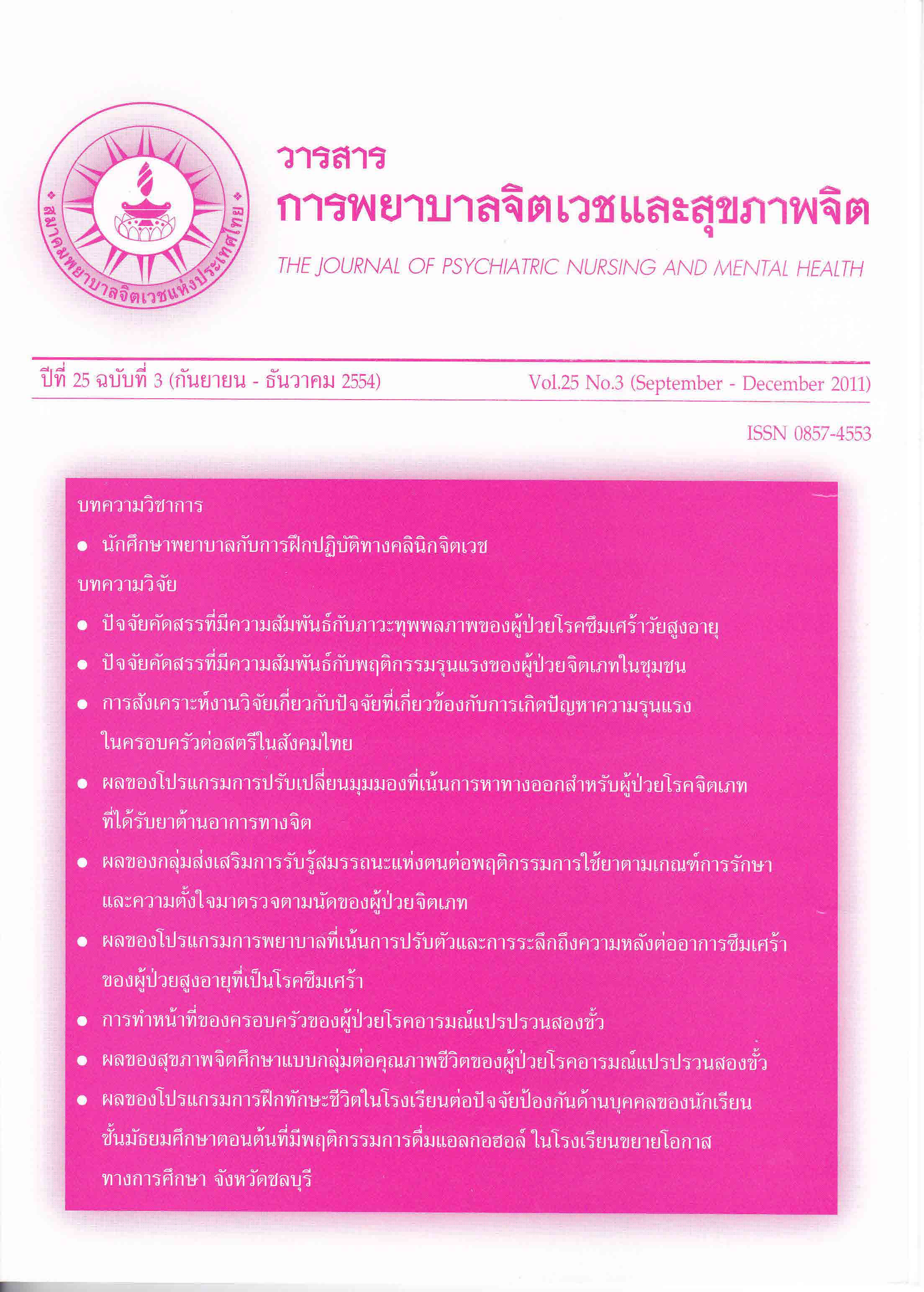ผลของโปรแกรมการพยาบาลที่เน้นการปรับตัวและการระลึกถึงความหลังต่ออาการซึมเศร้าของผู้ป่วยสูงอายุที่เป็นโรคซึมเศร้า
Main Article Content
บทคัดย่อ
บทคัดย่อ
การวิจัยกึ่งทดลองแบบสองกลุ่มวัดก่อนและหลังการทดลองมีวัตถุประสงค์ คือ เพื่อเปรียบเทียบอาการซึมเศร้าของผู้ป่วยโรคซึมเศร้าวัยสูงอายุ ก่อนหลังและระหว่างกลุ่มที่ได้รับโปรแกรมการพยาบาลที่เน้นการปรับตัวและการระลึกถึงความหลัง และกลุ่มที่ได้รับการพยาบาลตามปกติ กลุ่มตัวอย่างคือ ผู้ป่วยโรคซึมเศร้าที่มีอายุ 60 ปีบริบูรณ์ขึ้นไป แผนกผู้ป่วยนอก จำนวน 30 คน และได้รับการจับคู่แล้วสุ่มเข้ากลุ่มทดลอง และ กลุ่มควบคุมกลุ่มละ 15 คน กลุ่มทดลองได้รับการดูแลตามโปรแกรมการพยาบาลที่เน้นการปรับตัวและการระลึกถึงความหลังที่ผู้วิจัยสร้างขึ้น โดยประยุกต์แนวคิดการปรับตัว และแนวคิดการระลึกถึงความหลังเข้าด้วยกัน และได้รับการตรวจความตรงตามเนื้อหาจากผู้ทรงคุณวุฒิจำนวน 5 ท่าน ประกอบด้วยการดำเนินกิจกรรมเป็นรายบุคคลจานวน 5 ครั้งๆละ 60 นาที ติดต่อกัน 3 สัปดาห์ กลุ่มควบคุมได้รับการพยาบาลตามปกติ เครื่องมือที่ใช้ในการรวบรวมข้อมูลได้แก่ 1) แบบวัดความเศร้าในผู้สูงอายุไทย 2) แบบทดสอบสภาพสมองเบื้องต้นฉบับภาษาไทย และ 3) แบบสัมภาษณ์การปรับตัวของผู้ป่วยโรคซึมเศร้าวัยสูงอายุ มีค่าความเที่ยงสัมประสิทธิ์อัลฟาของครอนบาคเท่ากับ .72, .82 และ .86 ตามลำดับ วิเคราะห์ข้อมูลโดย สถิติเชิงพรรณาและสถิติทดสอบที ผลการวิจัยสรุปได้ดังนี้
1. อาการซึมเศร้าของผู้ป่วยโรคซึมเศร้าวัยสูงอายุ หลังได้รับโปรแกรมการพยาบาลที่เน้นการปรับตัวและการระลึกถึงความหลังต่ำกว่าก่อนได้รับโปรแกรมการพยาบาลที่เน้นการปรับตัวและการระลึกถึงความหลังอย่างมีนัยสำคัญทางสถิติที่ระดับ .05 (t = 5.91)
2. อาการซึมเศร้าของผู้ป่วยโรคซึมเศร้าวัยสูงอายุกลุ่มที่ได้รับโปรแกรมการพยาบาลที่เน้นการปรับตัวและการระลึกถึงความหลังต่ำกว่ากลุ่มที่ได้รับการพยาบาลตามปกติอย่างมีนัยสำคัญทางสถิติที่ระดับ .05 (t = -3.12)
คำสำคัญ : การปรับตัว, การระลึกถึงความหลัง, อาการซึมเศร้า, ผู้ป่วยโรคซึมเศร้าวัยสูงอายุ
Abstract
The purpose of this quasi-experimental research using the pretest-posttest design were to compare the depressive symptoms of older persons with major depressive disorder before and after receiving the nursing program enhancing adaptation and reminiscence; between the experimental and the control group. Thirty subjects, aged 60 years and older, whose diagnosed as major depressive disorder, were recruited from the outpatient department. The potential subjects, were matched pair and then randomly assigned to the experimental and the control group, 15 subjects in each group. The experimental group received 5 session, 60 minutes each nursing program enhancing adaptation and reminiscence for three weeks, while the control group received nursing care as usual. The concepts of Roy’s adaptation model and reminiscence were integrated into the program and validated for content validity by five experts. The instruments employed in data collection included 1) Thai Geriatric Depression Scale (TGDS), 2) Thai Mental State Exam (TMSE), and 3) The adaptation questionnaires. The Chronbach’s alpha coefficient reliability of the questionnaire for instruments was .72, .82 and .86, respectively. Data were analyzed by descriptive statistics and t-test.
Major findings were as follows:
1. The depressive symptoms of older persons with major depressive disorder who received the nursing program enhancing adaptation and reminiscence was significantly lower than those before receiving the program (t = 5.91, p < .05).
2. The depressive symptoms of older persons with depressive disorder who received the nursing program enhancing adaptation and reminiscence was significantly lower than those who received regular care (t = -3.12, p < .05).
Keywords : Adaptation, Reminiscence, Depressive Symptoms, Older persons with Major depressive Disorder
Article Details
บทความที่ได้รับการตีพิมพ์แล้ว เป็นลิขสิทธิ์ของสมาคมพยาบาลจิตเวชแห่งประเทศไทย

